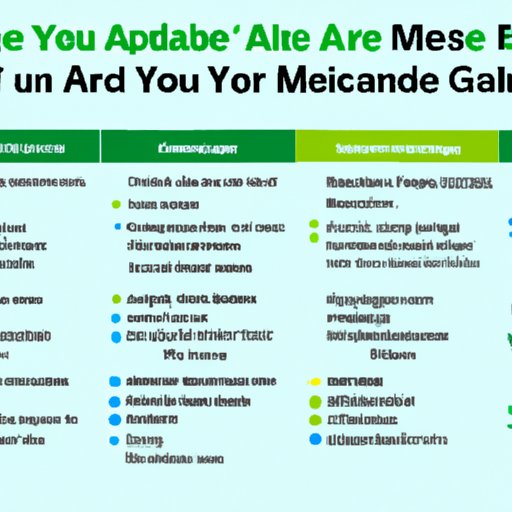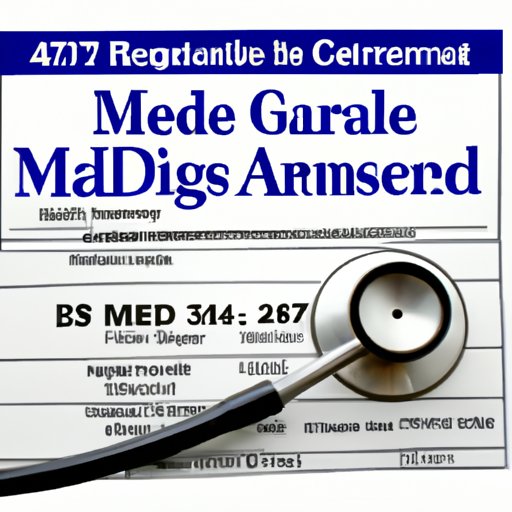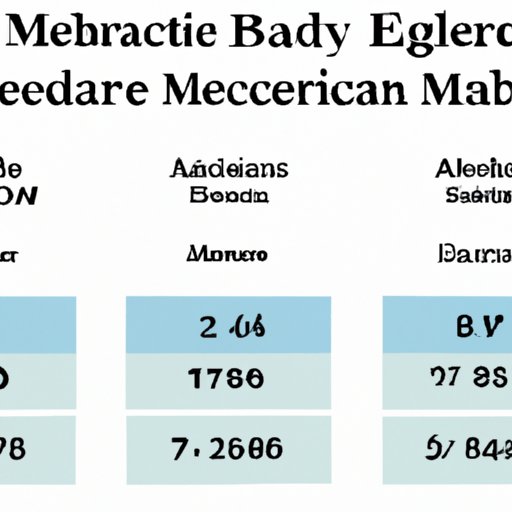Introduction
Medicare is a health insurance program available to people who are 65 or older, certain younger people with disabilities, and people with End-Stage Renal Disease (ESRD). The eligibility criteria for Medicare depends on a number of factors, including age. This article will explore the age requirement for Medicare eligibility and how it affects your ability to receive coverage.
Explaining Medicare Eligibility by Age
In general, if you are 65 or older, you are eligible for Medicare. People under 65 may also be eligible for Medicare if they meet certain criteria, such as having a disability or having ESRD. Here’s a closer look at the qualifications for those 65 and older and those under 65.
Eligibility for Those 65 and Older
If you are 65 or older, you are automatically eligible for Medicare, regardless of your income level or other factors. You can enroll in Medicare during your initial enrollment period, which begins three months before the month you turn 65 and ends three months after the month you turn 65. If you miss this window, you can still enroll during the general enrollment period, which runs from January 1 to March 31 each year.
Eligibility for Those Under 65
If you are under 65, you may be eligible for Medicare if you meet certain criteria. For example, you may be eligible if you have a disability, or if you have End-Stage Renal Disease (ESRD). Additionally, some people who are under 65 may be eligible for Medicare if they are receiving Social Security Disability Insurance (SSDI) benefits.

A Comprehensive Guide to Medicare Eligibility by Age
When determining your eligibility for Medicare, it’s important to understand what is included in the coverage and the estimated costs associated with different levels of coverage. Here is a comprehensive guide to Medicare eligibility by age.
What is Included in Medicare Coverage
Medicare provides coverage for hospitalization, doctor visits, prescription drugs, and preventive care. Depending on the type of plan you choose, there may be additional benefits, such as vision and hearing coverage. Medicare also offers supplemental plans that provide additional coverage.
Cost Estimates for Different Levels of Coverage
The cost of Medicare coverage varies depending on the type of plan you choose and the level of coverage you need. Generally speaking, Medicare Part A has no premium for most people, but there may be a deductible and coinsurance. Medicare Part B typically has a monthly premium, and Medicare Part D has an annual deductible and coinsurance. Supplemental plans may also have premiums and deductibles.

How the Age Requirement Impacts Your Medicare Eligibility
Your eligibility for Medicare is affected by several factors, including your age. Age is an important factor because it determines when you are eligible to enroll in Medicare and how much you will pay for coverage. Here’s a closer look at how age impacts your Medicare eligibility.
Factors That Can Change Your Eligibility
There are several factors that can affect your eligibility for Medicare. These include your income level, whether or not you are receiving Social Security benefits, and whether or not you have a disability or End-Stage Renal Disease (ESRD). In addition, your age can impact your eligibility.
Changes in Eligibility Based on Age
The age requirement for Medicare eligibility is 65. This means that if you are 65 or older, you are automatically eligible for Medicare. However, if you are under 65, you may still be eligible for Medicare if you meet certain criteria, such as having a disability or having ESRD.
What You Need to Know About Medicare Eligibility and Age
It’s important to understand the age criteria for Medicare eligibility so that you can determine if you are eligible for coverage. Here’s a breakdown of the eligibility requirements for people between the ages of 65 and 74, as well as those over 75.
Eligibility Requirements for People Between the Ages of 65 and 74
If you are between the ages of 65 and 74, you are automatically eligible for Medicare. You can enroll in Medicare during your initial enrollment period, which begins three months before the month you turn 65 and ends three months after the month you turn 65. If you miss this window, you can still enroll during the general enrollment period, which runs from January 1 to March 31 each year.
Eligibility Requirements for People Over 75
If you are over 75, you are still eligible for Medicare. You should contact your local Social Security office to find out more information about how to enroll in Medicare.

Understanding the Age Criteria for Medicare Eligibility
Once you know if you are eligible for Medicare based on your age, it’s important to understand the different types of Medicare plans available to seniors and how age impacts the cost of coverage. Here’s a look at what you need to know.
Different Types of Medicare Plans Available to Seniors
Seniors have several different types of Medicare plans available to them. These include Original Medicare, Medicare Advantage, and Medicare Supplement (Medigap) plans. Each of these plans provides different levels of coverage and has different costs associated with them.
How Age Impacts the Cost of Medicare Coverage
The cost of Medicare coverage varies depending on your age. Generally speaking, the older you are, the higher your premiums and deductibles will be. Additionally, some Medicare plans may offer discounts for seniors who are 65 or older.

A Breakdown of Medicare Eligibility by Age
Here is a breakdown of the eligibility requirements for people aged 65-74 and those aged 75 and older.
Eligibility Requirements for People Aged 65-74
If you are between the ages of 65 and 74, you are automatically eligible for Medicare. You can enroll in Medicare during your initial enrollment period, which begins three months before the month you turn 65 and ends three months after the month you turn 65. If you miss this window, you can still enroll during the general enrollment period, which runs from January 1 to March 31 each year.
Eligibility Requirements for People Aged 75 and Older
If you are over 75, you are still eligible for Medicare. You should contact your local Social Security office to find out more information about how to enroll in Medicare.
An Overview of Medicare Eligibility Based on Age
Age is an important factor in determining eligibility for Medicare. If you are 65 or older, you are automatically eligible for Medicare. If you are under 65, you may be eligible for Medicare if you meet certain criteria, such as having a disability or having ESRD. Additionally, age can affect the cost of Medicare coverage, as older people typically have higher premiums and deductibles.
Conclusion
In conclusion, understanding the age requirement for Medicare eligibility is essential for determining if you are eligible for coverage. If you are 65 or older, you are automatically eligible for Medicare. If you are under 65, you may be eligible for Medicare if you meet certain criteria, such as having a disability or having ESRD. Additionally, age can affect the cost of Medicare coverage, as older people typically have higher premiums and deductibles.
(Note: Is this article not meeting your expectations? Do you have knowledge or insights to share? Unlock new opportunities and expand your reach by joining our authors team. Click Registration to join us and share your expertise with our readers.)
